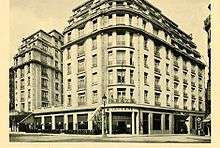Congolese Round Table Conference

| ||||||||||||||||||||||||||||||||||||
The Congolese Round Table Conference, also known as the Round Table Conference of Brussels, was a meeting organized in two parts[1] in 1960 in Brussels (January 20 - February 20[2] and April 26-May 16 [3]) between on the one side representatives of the Congolese political class and chiefs (French: chefs coutumiers) and on the other side Belgian political and business leaders.[2] The round table meetings led to the adoption of sixteen resolutions on the future of Belgian Congo and its institutional reforms. With a broad consensus, the date for independence was set on June 30, 1960.
History
The idea for a round table conference was first formulated in 1959 by the Congolese Labour Party (PTC, French: Parti Travailliste Congolais).[4] It gathered support from the Bakongo Alliance (ABAKO) and the Belgian Socialist Party (PSB).[4] The idea of a bilateral conference aimed at organizing the independence of the Belgian colony was in turn adopted by the minister of Belgian Congo and Ruanda-Urundi August De Schrijver.[5] Several factors contributed to this idea taking shape, including:

- Grassroots activism around popular figures like Joseph Kasa-Vubu and Patrice Lumumba[6]
- The riots of January 1959 in Léopoldville,[5] the worsening security climate[4] and the rising feeling of insecurity among colonial settlers.[7]
- The general sentiment of the inevitable and irreversible process of the decolonization of Africa.[8]
- Deteriorating local economy (the public debt of the colony rose from 4 to 46 billion Belgian franc between 1949 and 1960).[9]
- The failure of King Baudouin's second visit to Belgian Congo in December 1959 which didn't allow the political tensions to be reduced.[9]
The creation of a large scale Belgian-Congolese dialogue was also compatible with a speech from Belgian King Baudouin broadcast on January 13, 1959. Where he expressed the desire to "lead the Congolese populations, without harmful procrastination, but also without thoughtless haste, toward independence, in prosperity, and in peace."[10]
On January 3, 1960 the Belgian government announced it was convening a round table conference with the goal of helping the Congolese transition from colonial rule to independence.[3] The official opening of negotiations was 17 days later, January 20, with a speech of Prime minister Gaston Eyskens.[11]
Participants
Congolese delegation

The following notable Congolese political movements and representatives were present:[5]
- Alliance des Bakongo (ABAKO) - Edmond Nzeza-Nlandu, Joseph Kasa-Vubu and Daniel Kanza
- Mouvement national congolais-Kalonji (MNC-K) - Albert Kalonji and Joseph Ileo
- Mouvement National Congolais-Lumumba (MNC-L) - Patrice Lumumba (released from prison shortly after the start of the conference) and Victor Nendaka
- Confédération des associations tribales du Katanga (CONAKAT) - Moïse Tshombe
- Union des Bateke-Bahumbu (UNIBAT) - Pierre Mombele.
Besides a certain number of chefs coutumiers who were also invited to reduce the proportion of key independence figures[11] in the Congolese delegation, it is also worth noting the presence of then journalist, and Patrice Lumumba's secretary, Joseph Mobutu,[11] who would later come to seize power during a coup in 1965.
Belgian delegation
On the Belgian side, among others, the following people were present:[11]
- Gaston Eyskens, Prime Minister
- Albert Lilar, vice Prime Minister
- August Schrijver, Minister of Belgian Congo and Ruanda-Urundi ;
- Arthur Gilson, Defence Minister
- Pierre Harmel, Minister for the Civil Service
Étienne Davignon, future vice-president of the European Commission, was also at the conference attached to the Belgian Ministry of Foreign Affairs
Results
At the end of the conference, the following notable resolutions were adopted:[1]
- The declaration of independence of the Congo on June 30, 1960.
- The principles of the Congolese constitution, voted by the Belgian parliament in May 1960.
- The structural organization of the state and the separation of powers.
See also
- Indépendance Cha Cha, independence song created in conjunction with the conference.
- Table Ronde, a song written about the conference
References
- 1 2 Joseph Kamanda Kimona-Mbinga, "La stabilité du Congo-Kinshasa: enjeux et perspectives" 2004
- 1 2 Réseau documentaire international sur la Région des Grands Lacs, "Des «Dialogues» belgo-congolais aux Dialogues intercongolais 1960-2001: À la recherche de l'unité et de la légitimité en R.D.C."
- 1 2 Jules Gérard-Libois, Jean Heinen, "Belgique Congo - 1960" 1993
- 1 2 3 Joseph Mbungu Nkandamana, "L'indépendance du Congo belge et l'avènement de Lumumba" 2008
- 1 2 3 Bernard Laba Nzuzi, "L'équation congolaise: visiter le passé afin de mieux s'armer pour l'avenir " 2007
- ↑ World Perspective Monde - Université de Sherbrooke, "Proclamation de l'indépendance du Congo Belge" 2007
- ↑ Pierre Stéphany, "Les années 60 en Belgique" 2006
- ↑ Persee - Revues scientifiques, "L'avènement du Congo belge à l'indépendance"
- 1 2 Jean I. N. Kanyarwunga, "République démocratique du Congo: les générations condamnées : déliquescence"
- ↑ The political future of the Belgian Congo; the royal message and the government's declaration of January 13, 1959 (1959). Office de l'information et des relations publiques pour le Congo belge et le Ruanda-Urundi. 1959.
- 1 2 3 4 Le Potentiel, "La table ronde de Bruxelles comparée à la conférence nationale souveraine" 1995
_-_Commemoration_Independence_Stamp.jpg)